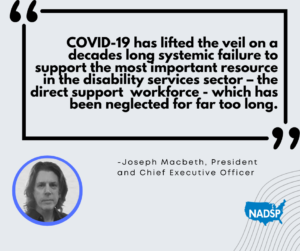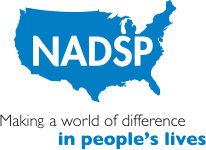Despite federal law and court decisions over the past 30 years, the ongoing battle fought by people with disabilities seeking to fulfill their human and civil rights has only been illuminated during this wretched pandemic. The lack of dignity, respect and justice further illustrate the continuing need for us to advance this movement toward social equality. Hidden in the shadows with this devalued group of citizens is our devalued direct support professionals. This anonymous workforce has stood side-by-side with those they support, establishing new daily routines, teaching social distancing practices and comforting them while unable to visit their family and friends.

According to a recent study on COVID-19 and the Direct Support Workforce by NADSP and the Institute on Community Integration at the University of Minnesota, nearly 74% of respondents indicated they were the primary wage earners in their household. The survey also showed respondents earning an average of $13.63 per hour with only 24% of respondents indicated they were paid higher wages during the pandemic. Even before the pandemic, additional resources were desperately needed to attract competent, qualified staff to fill vacancies and retain veteran staff, but 26% of respondents indicated they were now even more short-staffed due to COVID-19 and many employees were working a high number of overtime hours. Yet, we rely on direct support professionals as our “heroes”, the “backbone” of this service system, the “essential workers” on whose shoulders we stand during pandemics and natural disasters, who often put their own health and the health of their families at great risk.
The 1.3 million direct support professionals who provide direct support to people with intellectual and other developmental disabilities bravely report to work throughout this pandemic, yet if you try to lookup their standardized occupational classification (SOC) with the Bureau of Labor Statistics (BLS) you will not find one. The SOC is designed to reflect the current occupational composition in the U.S. and to catalog all occupations in which work is performed for pay or profit. Information about occupations, such as employment levels and projections, pay and benefits, skills required, and demographic characteristics of job holders is widely used by individuals, businesses, researchers, educators, and public policymakers. Sadly, we have no way to collect data on this workforce and they largely remain anonymous, which early in the pandemic led to great confusion on whether they were deemed essential.
COVID-19 has lifted the veil on a decades long systemic failure to support the most important resource in the disability services sector – the direct support workforce – which has been neglected for far too long.
We Need Your Help – Please Support the NADSP
Prior to the pandemic, we traveled across the country engaging with tens of thousands of direct support professionals each year, promising to make sure their voices are heard. Sadly, the vast majority of the direct support workforce has not been given fair compensation or career ladder opportunities that they rightfully deserve. This lack of professional recognition not only devalues the direct support professional, but also reflects greatly on how people with disabilities are viewed in our society. People with disabilities and their families expect nothing less than a competent, highly skilled, ethical professional to support them with their physical and emotional needs.
The NADSP is the only national organization whose sole mission is to promote lifelong learning opportunities for direct support professionals, providing them with access to career pathways and continuously seeking ways to improve the way we support people with disabilities at the point of interaction.
More specifically, we offer training and technical assistance, skill development in competency areas, a Code of Ethics, Frontline Supervisor certifications and an exciting new E-Badge Academy where direct support professionals can earn digital badges (based on validated competencies) which are then stacked into three levels of certification. Furthermore, NADSP members have access to webinars, newsletters and discounts on our products and conferences all of which support the knowledge, skills and values of the direct support workforce.
I ask that you make a commitment to their ongoing learning and professional development. Recognize them through career ladder opportunities and credentialing. This is a social justice issue that has plagued the disability service system for too long and it will take all of us, together, to create a new reality for our direct support professionals and the people they support.
If there is a long-term silver lining in this pandemic, it may be that our direct support workforce will finally be given the credit and opportunity that is long overdue. In order to do that, we need your help, please join the NADSP membership today.
Thank you,

Joe Macbeth

Long overdue – you have my full support
I find it maddening that a person being paid handsomely as a professional sports player can make headlines opting out of their season, claiming it to be too dangerous for them and their family, yet underpaid DSPs continue to do their work diligently and quietly. I have watched teachers shutting schools and marching in a media spectacle to their state capitols to make their valid points…and seeing changes as a result. The reality is, when this happens, the parents of little Johnny and Jane are inconvenienced while their teachers strike…if DSPs tried the same tactics, people would DIE.
It pains me to check the NADSP FB feed and read comments by those who grasp at explaining why they do the work. They try to rise above the fact that the DSPs are themselves abused as underpaid workers. Sure, many of us love the people we support and can experience this as a driving force to keep trying, but that still doesn’t justify why we must tolerate all of the turmoil we endure and the trickle down that is ultimately faced by the very same people we are there for. It is uncomfortable to realize that, in many cases, the people we support, while living in poverty themselves, have better resources than those that take the responsibility for supporting them and their safety!
Can you look at advocating to the likes of 60 Minutes or NPR to make documentaries about this plight? Perhaps get in touch with Geraldo Rivera to see if he might do a follow up about how things are going presently with people now in the community and the reality of this. Perhaps there are indie documentary makers/script writers out there looking to do a new project to sell to Netflix/Amazon/Etc? Get the plight of the DSP and those they support into MAINSTREAM! Being the respectful squeaky wheel is often the solution.
Thanks for all you are doing 🙂
I totally agree it is time to update the public on the story Geraldo Rivera did not too long ago regarding Willowbrook. What does living in a group home mean today, for the ones who have lived one for years and for those who are new to living in one. Both groups, if not more, have had changes in their lives since the days of Willowbrook. DSPs, not matter if you work in an Ira, in the community or worksite as a Community Habilitation/Mentor staff, have changed the lives of so many people with disabilities. However, we are not considered front line workers to the public; our role is so unknown to the public. People with disabilities have so much to contribute to society; the state of affairs during the pandemic has set them back even more. Now more than ever, we are so needed.
It could also be argued that the lack of a coordinated testing plan shows disrespect for the DSPs and the people they serve as well.
Being a dedicated long time DSP…from the bottom of my heart, I thank you for your eloquent words and continuous support to help promote a more respected workplace environment!
Beautifully written
Joe as always very eloquent description of the obstacles faced by Direct Support Professionals, who are the cornerstone of quality services and supports for the people we support. We need to continue to advocate for pay inequities as well as opportunities for growth and career advancement for this important workforce that impacts the lives of people with disabilities directly each and every day.